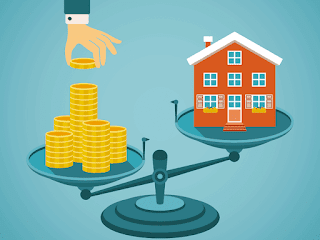Home Loan: Why NBFCs or Housing Finance Companies charge higher interest rates than Banks
Interest Rates on Home Loans (Banks vs. HFCs/NBFCs): Banks and certain non-banking finance companies (NBFCs) registered as Housing Finance Companies make home loans to customers (HFCs).
Nationalised banks and certain non-banking finance companies (NBFCs) registered as Housing Finance Companies make home loans to customers (HFCs). The Reserve Bank of India regulates all of these institutions (RBI). HFCs, on the other hand, charge greater interest rates on house loans than banks.
HFCs offer higher interest rates, according to Finance Minister Nirmala Sitharaman, because they often raise capital from the market or other lenders. Banks, on the other hand, can obtain cash at a reduced cost because they have access to zero-interest currency accounts and savings account deposits. This was stated by the Finance Minister in a recent written response to a question in the Rajya Sabha.
"Is Government aware of the fact that some Non-Banking Financial Companies (NBFCs) are demanding almost double rate of interest on Home loans from persons dwelling in tier 1,2, and 3 cities as compared to nationalised banks?" the inquiry asked.
"As advised by National Housing Bank (NHB), the rate of interest levied by HFCs begins at 6.50 percent p.a.," Sitharaman remarked in response to the question. Because the Reserve Bank of India (RBI) has deregulated interest rates, the rates are set by the HFCs' Board of Directors. The rate of interest paid to an individual borrower is determined by a number of criteria, including the cost of funds for HFCs and other characteristics such as the borrower's profile, credit history/score, income stability, loan amount, loan tenure, and so on."
"According to the NHB, the rate of interest charged by such HFCs is generally higher than that charged by banks because banks have access to nil or low-interest current and savings account deposits, resulting in lower cost of funds for them, whereas HFCs typically raise funds from the market or other lenders," she added.
The RBI's instructions, which were published in a circular dated February 17, 2021, address the control of exorbitant interest charges as well as the fair practise code for HFCs.
"According to this circular, each HFC's Board of Directors shall adopt an interest rate model that takes into consideration important elements such as cost of funds, margin, and risk premium in order to determine the rate of interest to be charged on loans and advances." The rates of interest, risk grading approach, and penal interest must be given to borrowers in the application form and in the sanction letter, in addition to being made available on their website or in media," Sitharaman added.
"HFCs have also been urged to put in place an internal framework to oversee the process and operations in order to ensure proper openness in contacts with borrowers," she continued.
Conclusion
There's no need to be discouraged if your personal loan application is turned down. To boost your chances of loan approval, simply work on improving your credit report and following the methods outlined above. Once you've completed this checklist, you're ready to submit your personal loan application.To find about the best pricing and deals, call our toll-free number +91-9477079053. They'll help you in every way they can. Please contact me at Best Home Loan In India if you have any more.



Comments
Post a Comment